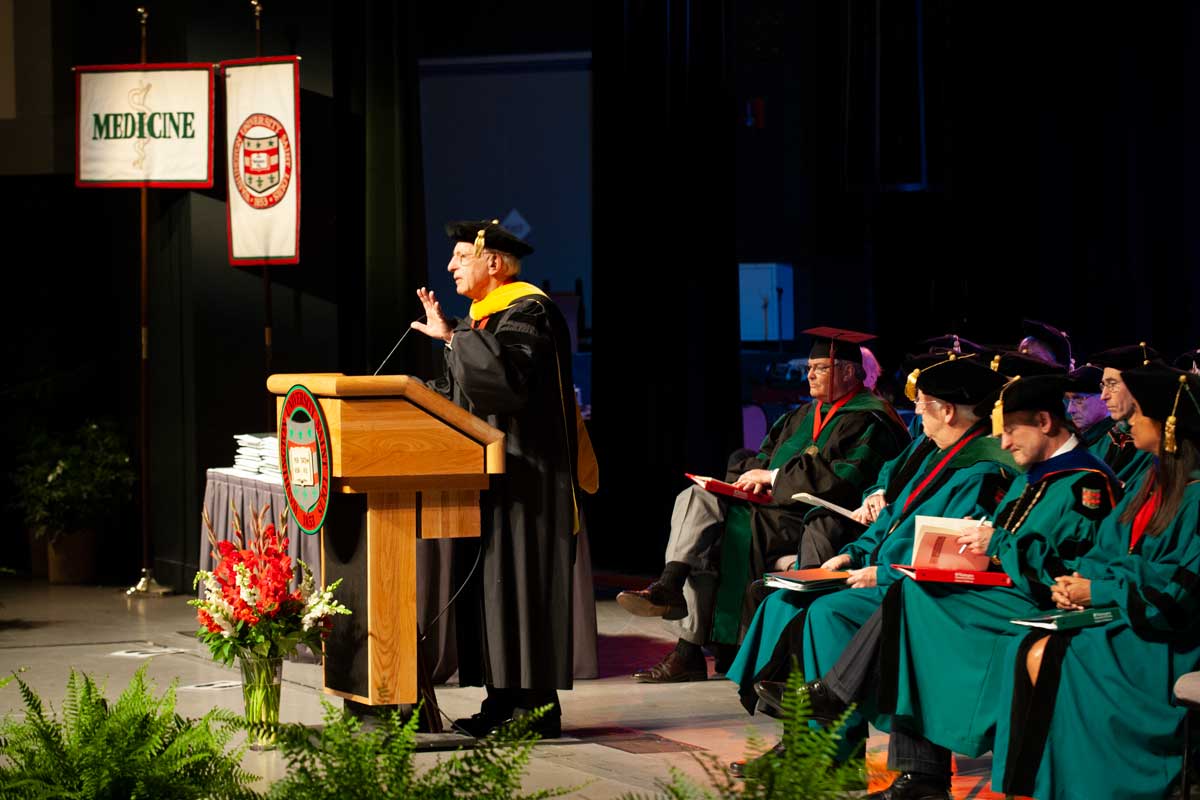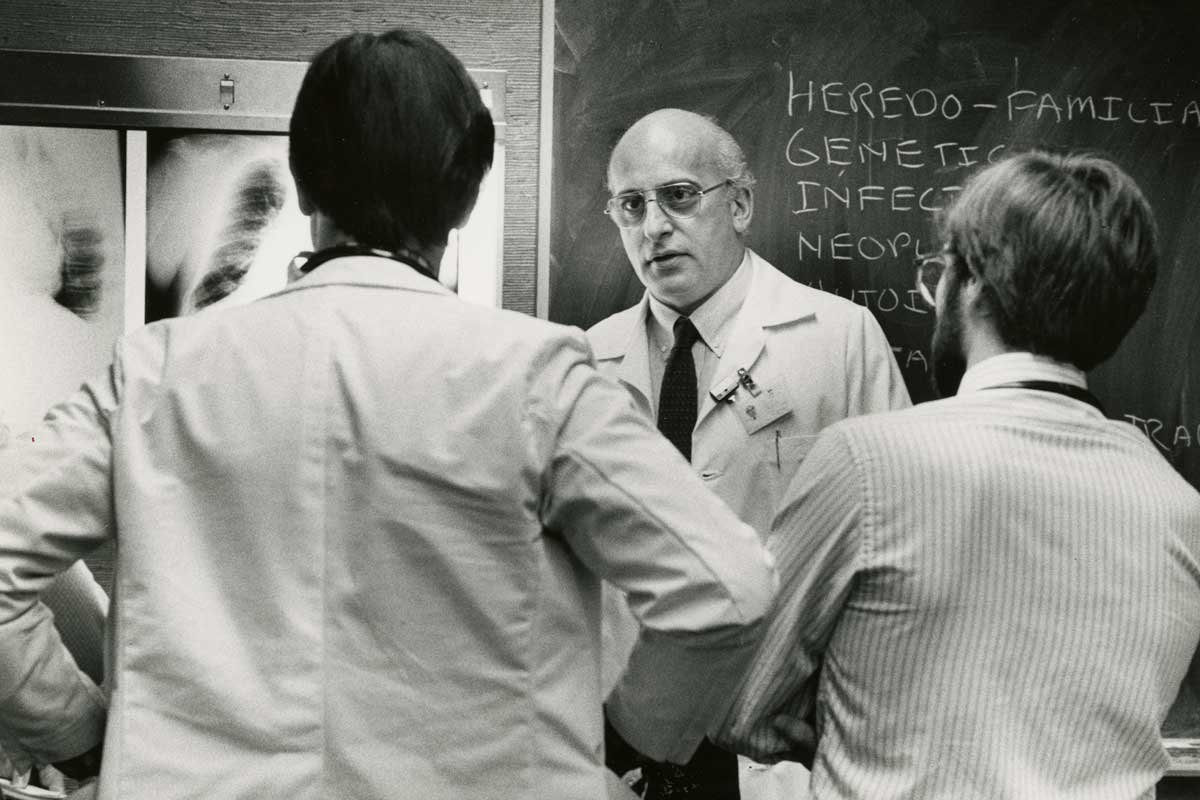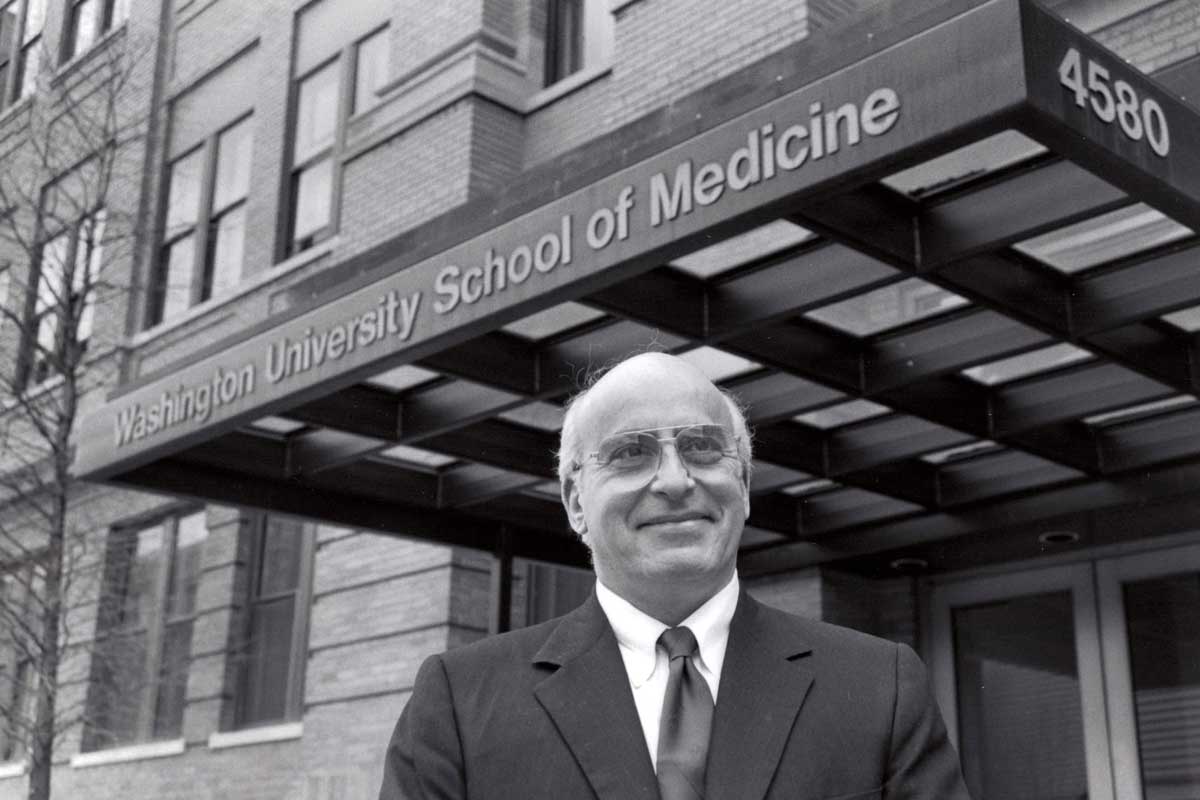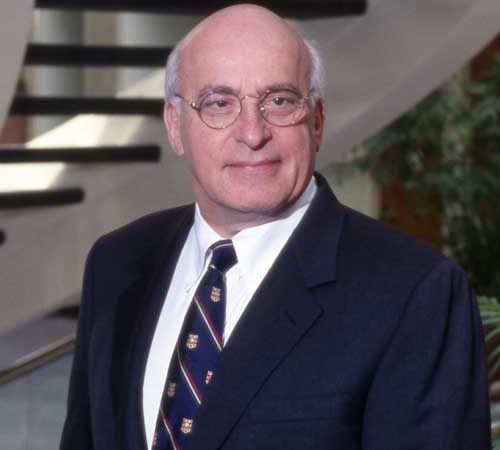William A. Peck, MD, former executive vice chancellor and dean of Washington University School of Medicine in St Louis, died peacefully, surrounded by family, Wednesday, Feb. 22, 2023, at his home in St. Louis County, Mo. He was 89.
The first to hold the positions of both executive vice chancellor and dean at the university, Peck also served as president of Washington University Medical Center during a span when the School of Medicine became one of the nation’s leading centers for medical research and academic clinical practice, as well as one of the most academically selective medical schools.
As Peck worked to elevate the school’s stature over his 14-year tenure as dean, he focused heavily on recruiting top researchers, educators and staff; on fostering infectious collaboration among those on his leadership team; and on raising the school’s research profile in genetics, neurodegenerative disease and basic science.
Under his leadership, the university opened the Center for Advanced Medicine, a 14-story building aimed at providing state-of-the-art clinical and outpatient surgical space for the school’s rapidly growing Faculty Practice Plan. The building houses Washington University outpatient clinics and operating rooms and also includes the Alvin J. Siteman Cancer Center at Barnes-Jewish Hospital and Washington University School of Medicine, which was launched in 1999, also during Peck’s tenure.
After stepping down as dean, Peck established the Center for Health Policy (now the Center for Economics & Health Policy) at the university’s Institute for Public Health and became a nationally recognized leader in health policy, particularly in the areas of rising costs, disparities in access to care, workforce shortages and errors and inefficiencies in providing medical care.
“Bill could have been eminently successful in a dozen walks of life — business, finance, music and anything that requires skills with people,” former chancellor William H. Danforth, MD, said as Peck was preparing to step down as dean in 2003. “Luckily, he chose medicine and Washington University.”
When Peck left his leadership position, the school honored him with the creation of the Peck Scholars program, aimed at providing scholarships to medical students based on need and merit. Peck embraced the honor and the program, and he and his wife had an active and generous role in supporting it.

David H. Perlmutter, MD, executive vice chancellor for medical affairs, the George and Carol Bauer Dean of the School of Medicine and the Spencer T. and Ann W. Olin Distinguished Professor, lauded Peck for leading the School of Medicine so deftly through a tremendous period of growth.
“Bill Peck was at the helm at a time when the School of Medicine was on the precipice of growth and change, on multiple levels,” Perlmutter said. “He had a knack for inspiring physicians and scientists. He led the effort to establish a comprehensive cancer center, and it was his vision that started the faculty practice plan that is now Washington University Physicians, both of which are now among the most impactful clinical programs in the nation. His sensibility about the community led to expansion of redevelopment efforts in nearby neighborhoods and a bolstering of the role of the medical school in essential safety net clinical care. He was a deeply admired mentor, and a lot of our stature as a medical school can be attributed to that.”
Peck also was a noted physician-scientist, known for his research on bone and mineral metabolism. Focusing on the understanding and treatment of osteoporosis, he developed the first method for directly studying the structure, function and growth of bone cells and determined mechanisms by which hormones regulate bone function.
He was born in New Britain, Conn., where his father, Bernard, was a general practitioner, maintaining a medical office adjacent to the family’s home. At age 7, Peck contracted osteomyelitis, an infectious inflammatory disease of the bone. With limited treatment options, Peck had surgery for the life-threatening illness. His experience helped spur him to pursue a career focused on bones and bone metabolism.
He graduated from Harvard College in 1955, with a degree in biochemical sciences. He went on to earn his medical degree from the University of Rochester School of Medicine in 1960. He then completed two years of residency training in internal medicine and a one-year fellowship in metabolism at what was then Barnes Hospital. He then served for two years as a clinical associate at the National Institutes of Health (NIH), where he worked in the area of arthritis and metabolic diseases.
In 1963, he became chief resident at Strong Memorial Hospital at the University of Rochester, and he remained on the faculty there, eventually becoming a professor of medicine and biochemistry and the head of endocrinology. In 1976, he was appointed the John E. and Adaline Simon Professor of Medicine and co-chairman of the Department of Medicine at Washington University, as well as physician-in-chief at what was then Jewish Hospital of St. Louis. He became vice chancellor for medical affairs and dean of the School of Medicine in 1989 and was named executive vice chancellor in 1993. When he stepped down from his leadership role, he was named the Alan A. and Edith L. Wolff Distinguished Professor in the Department of Medicine.

“Dr. Peck not only will be remembered for his impressive tenure as head of medicine at Jewish Hospital and then dean, but for his major contributions to the field of medicine, particularly to the understanding of bone diseases,” said Victoria J. Fraser, MD, the Adolphus Busch Professor and head of the Department of Medicine. “But he also will be remembered for being an incredibly visionary leader who had a tremendous eye for talent and a commitment to faculty development. He recruited a large number of outstanding department heads and also mentored junior and midcareer faculty into important leadership roles in science, medical administration and clinical care. He knew everyone and their story and cared deeply about the people inside the buildings.”
Peck was the founding president of the National Osteoporosis Foundation. He was also a member of the American Society for Bone and Mineral Research, serving as that group’s president in 1984. Further, he was a member of the American Society for Clinical Investigation, the Association of American Physicians and the American Association for the Advancement of Science. He also served as chair of the American Association of Medical Colleges (AAMC) and as chair of the AAMC Council of Deans.
Additionally, Peck served on numerous boards and advisory boards, including those at Centene, Hologic, Innovate St. Louis, Memory Care Home Solutions, Pritikin, St. Louis Regional Chamber and Growth Association, and TIAA.
He was also a gifted pianist and often performed at School of Medicine and alumni functions. Several years ago, he released a CD. The back cover read: “Dr. Peck usually plays a Steinway, sometimes plays a Yamaha Concert Series, occasionally plays a weighted Hammond, and in his spare time, doctor.”
Peck is survived by his wife, Patricia Hearn Peck; their blended family of children, David Peck, Edward Peck, Kate Peck Nelson, Andrea Harbin Niehoff, Elizabeth Harbin and Katy Hinkley; and two grandchildren, Joey Niehoff and Jaki Nelson.
A memorial service open to the many people who knew him will be held at Graham Chapel at a later date.
In lieu of flowers, memorial contributions may made to the Peck Scholars Program at the School of Medicine: Washington University c/o Advancement Services; MSC 1082-144-2555; 1 Brookings Drive, St. Louis, MO 63130.

Source: Read Full Article
